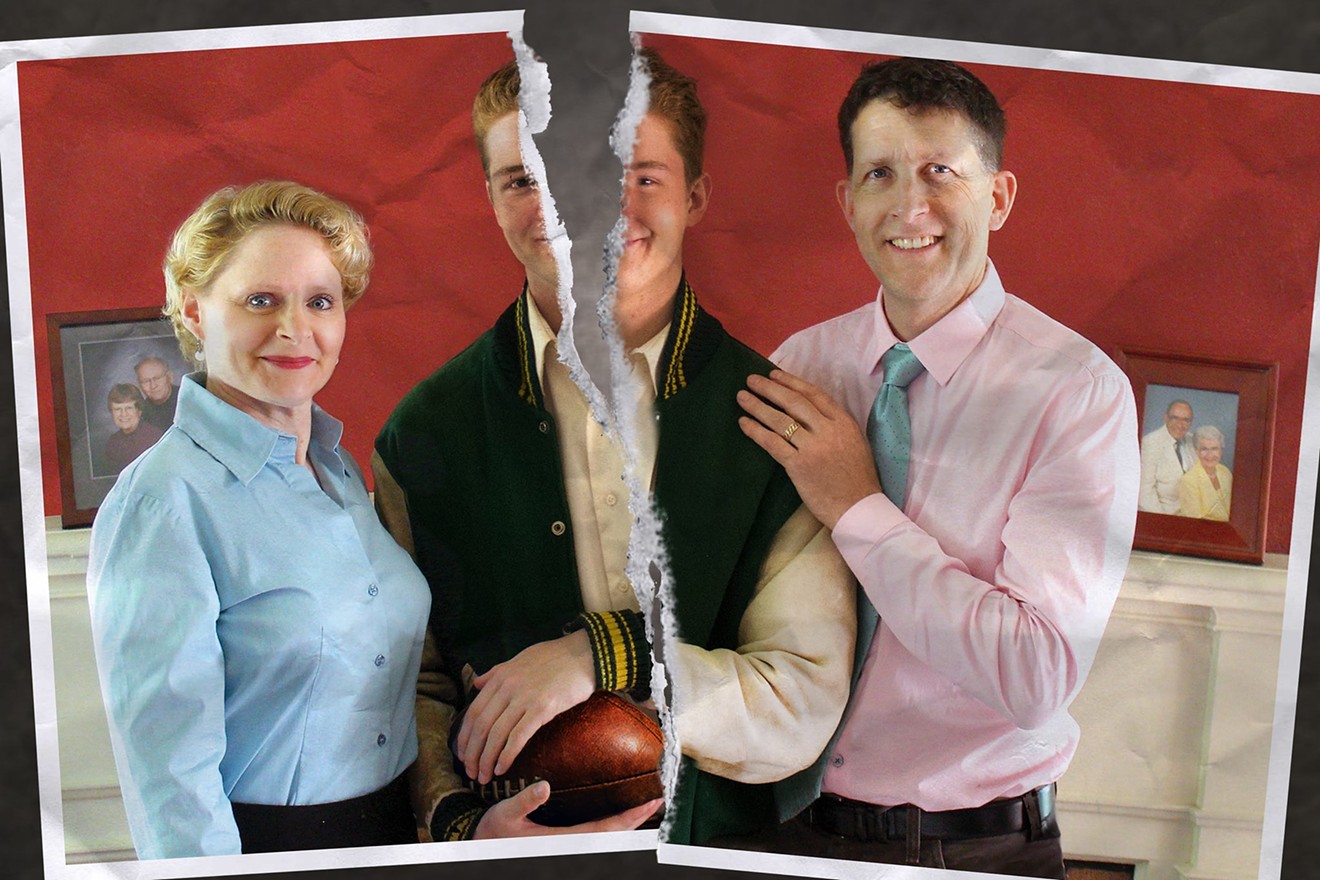Westword: What drove you to commission a play about this subject?
David Wintersteen: As the parents of an adult son, we’ve been very conscious about what’s going on in the world and trying to raise a good boy. This play is certainly not based on our son at all, just for the record; it’s not him or about him. It struck us, over and over the last couple of years as we saw one story after another — Brock Turner's just one of many — it really highlighted that there’s a conversation that we’re not having in our society.
Another part of it for me was a student of mine [at Concordia College in Moorhead, Minnesota] was transitioning, female-to-male, in college, and he was struggling somewhat, socially. And it occurred to me that he seemed to be making junior-high mistakes in his relationships. Which in some ways wasn’t surprising, because he was in his first year of being a guy. It made me really think, "How is it that we teach boys in our society to be good men?" Between this particular student that I knew, the Brock Turner case and all these other cases, and our own experience of raising a boy and trying to do it well, and having awkward conversations in order to teach him things, that, for me, was the impetus to tackle this subject. It just seems like it’s a topic that isn’t out there. I think in the last decade, as a society, we’ve done a much better job of teaching our daughters to be safe and not be raped. We haven’t done as good of a job of teaching our sons not to rape. At Theatre B, we do thought-provoking shows that are going to inspire discussion and thought and challenge people, and this fit the bill.
Carrie Wintersteen: Did David tell you about how Rob wrote the play?
I'd love to hear it.
David: One of the things he told us about the process was that he sat down and just started writing dialogue. After a couple pages, it occurred to him that while we were commissioning a play to be written for us, that maybe rather than assigning the characters as David, Carrie, David, Carrie, he would assign then A, 1, A, 1 so that this play could be performed by any couple, gay or straight or lesbian. Who is playing which role is open. One of our first tasks was to read the play several times and figure out who was going to play which role, which wasn’t immediately apparent. We flipped and flopped a couple of times, actually.
Carrie: His intent was to neutralize the role that gender as a parent has in the perspective that you might take, or the side of the argument you might be more inclined to understand or sympathize with. But it has to be somewhat both possible and impossible, neutral and judgmental. For each parent, there's a point in this play where we might be on the side of the son and there’s other points where we’re on the side of the girl, at least in terms of trying to understand what happened.
What has working on this play been like?
David: Part of the joy of working on a new play is to help create something that hasn’t been there before. Most of the time, when we encounter plays, they’ve had runs on Broadway or Off-Broadway. They've been edited and published and highly polished. Oftentimes, by the time they get to theater companies out here in the Midwest, they may have had half a dozen productions. So they’ve really been crafted and tested and worked. We are at the very front edge of a new play that hopefully will turn into a play running on Broadway or Off-Broadway. It could happen – Rob is a successful New York playwright. We’re out there helping to be the beta testers for this play and help Rob figure out what works, what doesn’t work by throwing it up on its feet.
Carrie: There’s a Pulitzer Prize-winning playwright, Ayad Akhtar, who said something recently about how this phase of playwriting — workshop and rehearsal — is the research-and-development phase of this business. Playwrights really need theater companies and audiences to take that risk, or they wouldn’t write.... We like that role of being involved in the research and development and trying to invest in it. Because I think it’s important to the American canon that we keep encouraging playwrights to write stories to get out there. This is a current issue in society, and maybe this play will help us have an actual conversation about it.
"I think it’s important to the American Canon that we keep encouraging playwrights to write and stories to get out there. This is a current issue in society and maybe this play will help us have an actual conversation about it." -Carrie Wintersteen
tweet this
What questions do you two hope audience members will walk away pondering?
David: I’m hoping it will prompt some parents to have the awkward, funny conversations with their sons — and daughters — but particularly with their sons. Challenging work like this can create the opening for those conversations, so a person can come home and say to their son, “I saw an interesting play today,” and that’s all it needs in order to spark the awkward conversation.
When you’re saying awkward conversation, you’re talking about a conversation about consent, basically?
Yeah. Because it’s about sex. That’s what makes it awkward. Having raised a now-adult son and had some awkward conversations about sex, it’s not easy.
Carrie: Culturally, so many people just seem to avoid it, because they’re going to learn from their friends and the Internet. In the world of social media, they’re learning so many terrible things, and there’s no curation, there’s no filter. The parents still have that really important role to play.
I would hope that people also question their own assumptions about what their kids know and don’t know, or what we know about our neighbors or the way we instantly click-and-share stuff. We are all detectives-judge-jury right off the bat in all kinds of cases. Just recognize that every situation has all kinds of nuance to it. Sometimes that public sphere is not where something gets adjudicated. We need to figure out how do we make this less about, 'It’s a hot button, we throw it out there and we don’t really have an idea of whether there’s justice, whether that justice can be restorative, what kinds of relationships are just completely obliterated.' There’s social consequence to these kinds of events. We have to all own that together and be willing to have a constructive conversation and not always an accusatory conversation with one another. A willingness to explore how these things happen. I’d like to just not, but I think that’s kind of irresponsible. It’s important to say, ‘Wow. I don't know how a kid gets to the point where they do something like that.'
David: Ultimately, I hope that people will come out and join us in helping to create a new work.
The Boulder Fringe Festival, a sampling of diverse performances at eleven venues, runs now through August 26. Tickets and passes are available online and at Trident Booksellers & Cafe, 940 Pearl Street; you can also purchase tickets at venues thirty minutes before the first show of the day. Our Boy will play at Pine Street Church Fellowship Hall, 1237 Pine Street, Boulder, at 6:30 p.m. Thursday, August 17; 8 p.m. August 18; 5 p.m. August 19; and 3:30 p.m. August 20. For a schedule of other Fringe performances, visit boulderfringe.com.











